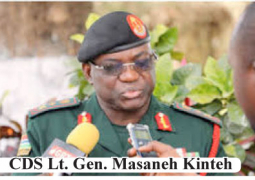The Chief Justice of The Gambia, Justice Emmanuel Akimoye Agim, has admonished Gambian journalists to always report issues, especially those dealing with court cases, with the right mindset, stressing that journalists should not be biased in reporting court proceedings.
Chief Justice Agim, who was speaking at the opening of a three-day training for journalists on the fundamentals of court reporting, opined that the actions or inactions of journalists can impact on the lives of people.
The training, which brought together journalists from the print and electronic media, came in the wake of the arrest and remand custody of three journalists within a month for contempt of court.
“You must give an unbiased report of court proceedings,” Agim told journalists.
According to the Chief Justice, in the field of journalism, one blunder can create a lot of common impacts; thus he called on journalists to be very careful in the way and manner they report.
He told journalists that their role as journalists is a sacred duty to contribute to nation-building.
“Journalists are the vanguard and watchdog of society,” he said, adding that how journalists perform this role can help or destroy society.
Noting that some journalists regard themselves as opposition supporters, Chief Justice Agim said the Gambia Press Union can only discharge its responsibility if it remains neutral.
He called on the union to reassess its role as media practitioners and the role of journalists in nation-building, noting that by the nature of their job, journalists contribute in deciding the destiny of society.
The Chief Justice went further to commend the union for its foresight in organizing such training for its members, noting that it will further help journalists to understand how to cover court proceedings.
Bai Emil Touray, president of the Gambia Press Union, GPU, underscored the significance of the training, which he said seeks to build the capacity of media practitioners.
“The Gambia Press Union believes that in order for journalists to execute their duties, they must have knowledge of the specific issues they need to talk about.
According to Touray, the training is important in the light of the fact that court reporting is sacrosanct.
“The GPU deems it necessary to partner with the Judiciary to build the capacity of journalists on the law and court reporting.
Noting that the training will not make the journalists lawyers, Touray said what it seeks to do is to build the capacity of journalists to enable them do their work to the best of their ability.
He stated that the training is not only about contempt, but goes beyond to deal with all aspects of the law that affect journalists.
He further told the gathering that this will not be the only training session, as more court reporters are yet to benefit from the training.
Also speaking at the opening ceremony was Pap Saine, Managing Director and co-publisher of The Point newspaper, who called for closer collaboration between the Judiciary and journalists.
According to Saine, journalists have a pivotal role to play in society, hence the need for them to be given the requisite training.
However, he urged journalists to always report accurately, and to make sure that they verify their facts before going to press.
Saine also underscored the need for journalists to be allowed access to information to facilitate their work, something which is, he said, of fundamental importance.
Read Other Articles In Article (Archive)
NADA Holds Communication Strategy Development Workshop
Jun 20, 2008, 2:54 AM



